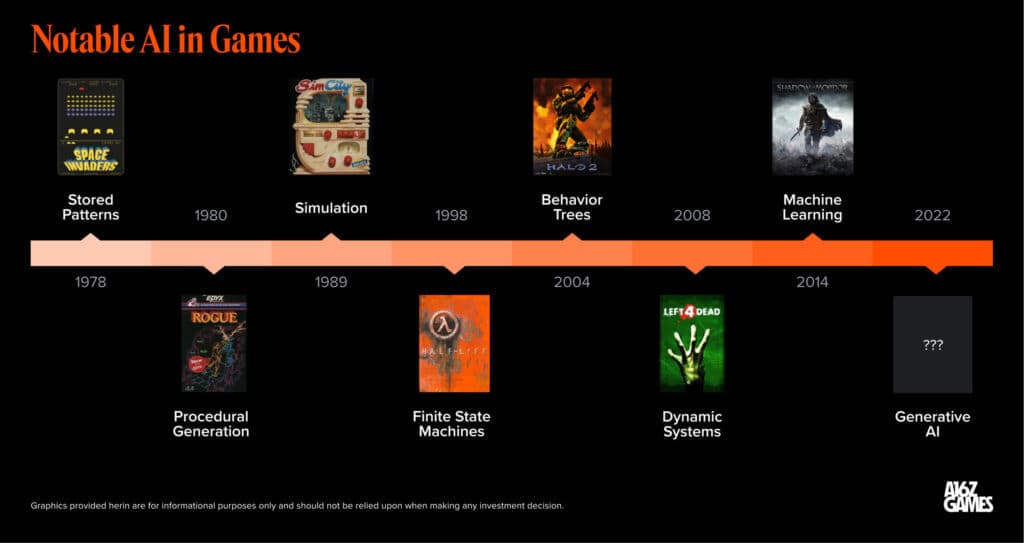How AI Will Create a New Category of Games: The NeverEnding Game

The NeverEnding Game: How AI Will Create a New Category of Games
This article explores the transformative potential of generative AI in the gaming industry, moving beyond mere efficiency gains to fundamentally changing the nature of games themselves. It posits that AI will enable new AI-first game categories and significantly expand existing genres, drawing parallels to historical AI advancements in gaming like procedural generation and AI directors.
Key Areas of AI Impact in Gaming:
-
Generative Agents: AI, particularly Large Language Models (LLMs), can make game agents more lifelike with emergent social behavior. Research demonstrates LLMs guiding agents with natural language, synthesizing experiences into reflections, and retrieving them to plan behavior, leading to incredibly lifelike emergent actions. This can create more immersive sim games, akin to a "next-generation Truman Show," where agent behavior is unpredictable and reflects human society. Personalization of agents through platforms like Character.ai and InWorld allows for custom NPCs with unique backstories and personalities. Interaction with agents is also evolving with advanced text-to-speech and real-time dialogue generation, potentially enabling persistent communication with in-game characters even when offline.
- Challenges: LLM biases, high compute costs for simulations, and the need for new norms around parasocial relationships with AI agents.
- Demand: High demand for generative agents, with a significant percentage of game studios planning to experiment with AI NPCs.
-
Personalization: The goal is to offer unique gameplay experiences for every player. This includes personalized character creation using text-to-image models, unique in-game items, and adaptive NPC dialogue based on player actions. Systems like Monolith's "nemesis system" in Shadow of Mordor and Ubisoft's "Ghostwriter" dialogue tool are early examples. Personalization enhances immersion and replayability, with a growing trend of players engaging in role-playing servers for games like Grand Theft Auto 5.
- Impact: Increased immersion and replayability, with personalization systems becoming integral for player engagement and retention.
-
AI Narrative Storytelling: Generative AI can enhance storytelling by enabling players to engage with beloved IP universes through AI-guided narratives, similar to Dungeons & Dragons. Companies like Latitude (AI Dungeon) and Hidden Door are applying LLMs to create interactive, personalized stories within established IPs. NovelAI uses its LLM, Clio, for sandbox storytelling and to assist human writers.
- Challenges: AI going "off the rails," maintaining memory and coherence, and the interpretability of closed-source LLMs.
- Potential: AI as a copilot for human storytellers, with applications in interactive shows and inspiration generation.
-
Dynamic World Building: AI can help create living game worlds, potentially generating levels and content in real-time as players progress. This concept is inspired by the "Mind Game" from Ender's Game. While current AI directors in games like Left 4 Dead and Dead Space dynamically adjust pacing and difficulty, future AI directors could generate entire worlds. Procedural generation, already used in games like Hades and Minecraft, can be augmented by machine learning for more sophisticated level design. AI is also accelerating asset creation, with tools like Midjourney and Adobe Firefly being used for concept art and 3D model generation.
- Future Vision: Real-time world generation using neural networks, blurring the lines between games and film.
- Caveat: Dynamic worlds need to be combined with other systems like personalization and generative agents to create truly engaging experiences.
-
An AI Copilot for Every Game: AI can act as a gaming copilot, coaching players and playing alongside them. This is particularly valuable for onboarding players to complex games like Minecraft and Roblox, enabling "Master Builders" through natural language prompts. AI copilots can also serve as co-op partners or opponents, learning player behavior to provide complementary or personalized gameplay. Examples include Forza's Drivatar system and DeepMind's AlphaStar. AI copilots can also create new gameplay modes, shifting focus from traditional skills to prompt engineering.
- Social Impact: AI copilots can enhance player retention by providing a social element, following the mantra "good alone, great with AI, best with friends."
Challenges and Conclusion:
Several hurdles remain, including legal ambiguities around AI-generated assets and copyright, ethical concerns about compensating creators of training data, and the high cost of running AI models at scale. However, the demand and developer interest in generative AI for games are undeniable. The article concludes that AI is poised to unlock a new category of AI-first games, potentially leading to "NeverEnding games" that offer unprecedented levels of engagement and immersion.
Key Takeaways:
- Generative AI will redefine game creation and gameplay.
- AI agents will become more lifelike and interactive.
- Personalization will offer unique experiences for every player.
- AI will revolutionize narrative storytelling and world-building.
- AI copilots will enhance player skills and social interaction.
- Significant legal, ethical, and technical challenges need addressing.
- The future of gaming lies in AI-first experiences.
Original article available at: https://a16z.com/the-neverending-game-how-ai-will-create-a-new-category-of-games/